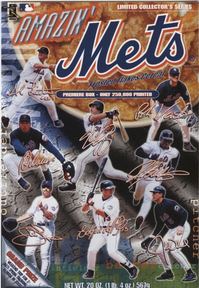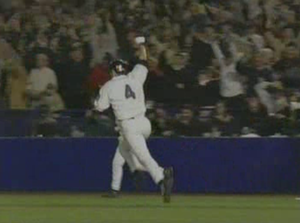Click here for an intro/manifesto on The 1999 Project.
 Over the final weekend of the regular season, Filip Bondy wrote in the Daily News of the sad tale of Famous Fixins. In the midst of the Mets’ hot summer, the company decided to produce 250,000 boxes of Amazin’ Mets cereal. (They also produced a Derek Jeter-themed version.) Making a quarter of a million of anything is a risky proposition, even more so if your product’s appeal hinges on the continued success of a sports team.
Over the final weekend of the regular season, Filip Bondy wrote in the Daily News of the sad tale of Famous Fixins. In the midst of the Mets’ hot summer, the company decided to produce 250,000 boxes of Amazin’ Mets cereal. (They also produced a Derek Jeter-themed version.) Making a quarter of a million of anything is a risky proposition, even more so if your product’s appeal hinges on the continued success of a sports team.
When the Mets cereal deal was first brokered, the team’s playoff chances seemed a sure thing. Now, as October dawned and the boxes began hitting the shelves, making the postseason was a longshot.
“Let’s just say I would have liked to be out with the stuff two weeks earlier,” said Famous Fixins spokesman Michael Simon.
The Mets must have wished they could’ve ended their season two weeks earlier, when they were still in striking distance of the NL East lead. Now, with three games to play, they were two games out of the playoff picture. Cincinnati and Houston were ahead of them, tied for first in the NL Central. Whichever team didn’t win the division would likely win the wild card, because they controlled their own destinies, and the Mets did not.
The Mets’ only remaining fight of the year might be against the league office. Following Bobby Valentine’s lead, GM Steve Phillips complained to the National League head office that umpire Phil Cuzzi (who manned home plate in the series finale against Atlanta) wouldn’t get help from the corner umps on check-swing calls.
For the moment, the Mets were still mathematically alive, hanging on to playoff hopes by the slimmest of margins. All they had to was sweep their last series of the year, and hope for some help from out of town. Standing in their way: the Pittsburgh Pirates.
October 1, 1999: Mets 3, Pirates 2 (11)
Hard as it may be to believe now, the Pirates of 1999 were not awful, simply mediocre (only two games under .500 as the final series began). They had some good players in their everyday lineup for most of the season, such as Jason Kendall, Ed Sprague, and Brian Giles, who hit 39 homers and drove in 115 runs. But all of them were out for the year with injuries, and the Pirates visiting Shea had little offense to speak of. Then again, the same
could be said of the Mets over the last week.
What the Pirates did have was good, young pitching (though most of them would have their best seasons elsewhere in the future). This was not good news for a Mets team that had been mostly quiet against the Braves’ aces, and did little more against the Phillies’ no-name pitchers.
In game one, they’d face Jason Schmidt. He had a good year for Pittsburgh, winning 13 and striking out 148 batters, but he was also susceptible to the longball: 22 home runs given up before this series.
The Mets took advantage of this weakness. Robin Ventura hit a one-out solo homer in the fourth, a line drive shot into the hometown bullpen. Mike Piazza did the same in the sixth with a 400-foot bomb to right-center to put the Mets up, 2-0. Unfortunately, they were unable to mount any other threats against Schmidt, as he scattered seven hits over his seven innings of work.
Opposing Schmidt: Kenny Rogers, who had some great starts in his brief Mets career, and some awful ones as well. He also retained the label of a pitcher who wilted in the bright lights of the New York stage. But he looked good this evening, with his trademark curveball working and an impatient lineup to flail away at it. The lefty gave up only three hits and struck out nine in the first seven innings.
Unfortunately, Rogers came out to start the top of the eighth inning and began to falter. He walked pinch hitter John Wehner (owner of a .185 batting average on the year) to leadoff the inning. Then, after striking out Al Martin, he gave up singles to Pat Meares and Aramis Ramirez, scoring Wehner to trim the Mets’ lead to one run.
Valentine might have waited so long to relieve Rogers because of equipment woes. The dugout bullpen phone was broken. He was given a walkie-talkie to replace the phone, but it malfunctioned. So he was given a replacement walkie-talkie for his replacement walkie-talkie, and that one malfunctioned, too. He communicated with his relievers as best he could, as messengers ran in and out of the bullpen all night, trying to figure out who should warm up, and when.
Amidst this communication breakdown, somehow Turk Wendell relieved Rogers, and he got a huge out by fanning Kevin Young, one of the Pirates’ few remaining offensive threats. But he followed up by walking Chad Hermansen to load the bases and bring up lefty batter Warren Morris. Valentine was short a southpaw, with Dennis Cook serving a one-game suspension for bumping an umpire in the Atlanta series.
So he went with John Franco, thus terrifying Mets fans everywhere. (As if in agreement, Wendell slammed his glove in anger against a water cooler as he walked off the field.) Franco had the unnerving habit of bringing his team to the brink of defeat (and occasionally sending them careening over that brink). In this case, he got what he probably wanted, a groundball from Morris. But that grounder bounced off the mound and lost momentum. Edgardo Alfonzo fielded the ball and heaved a throw to first, but it was too high and too late. Meares came into score, and the game was tied at 2.
Things looked even worse when Franco fell behind 3-0 to the next batter, Adrian Brown. One more ball off the plate would score the go-ahead run and perhaps end the Mets’ season for good. Franco fought back to get the count full, then threw a ball that, to most observers, appeared low. Home plate umpire John Hirschbeck interpreted it differently, and he called it strike three to end the inning.
The Mets got a break, but it appeared they would not capitalize on it, not even against a Pirates bullpen that was not exactly full of Mariano Riveras. They managed to load the bases with two outs in the bottom of the eighth, but were turned aside. Alfonzo walked to lead off the ninth, and was promptly erased on a groundout double play. Extra innings did not bring any sense of urgency, as they went down in order in the tenth.
Though Franco and Wendell faltered in the eighth inning, the Mets’ relievers had risen to the occasion all season, and they did so again in this game. Armando Benitez struck out the side in the ninth. A completely pumped Pat Mahomes worked around a leadoff infield single in the tenth, then set the Pirates down in order in the eleventh.
When the Mets came to bat in the bottom of the eleventh, the scoreboard brought them hope. In Houston, the Dodgers had defeated the Astros, while in Milwaukee, the Brewers rallied to tie the Reds at 3. If the Mets could find a way to win this game, no matter what happened in Milwaukee, they’d be just one game out of the wild card spot. And if the Reds lost, too, even better.
As Shawon Dunston pinch hit to lead off the inning, he heard the crowd roar (a decidedly smaller crowd than the ones seen in the Braves series, but a loud one). Assuming the reaction was scoreboard related, he snuck a peak and saw the good news. “I saw the final score and said, ‘Let’s get a win’,” he told reporters later.
Doing his part to make that a reality, Dunston singled to center field, then Melvin Mora laid down a sac bunt to move him to second. The Pirates walked Alfonzo intentionally, hoping for a double play from John Olerud (which he’d provided in the ninth). But Olerud hit a grounder to first, and the Pirates could only get the force there as Dunston and Alfonzo crossed over to second and third. With first open, Pittsburgh had no intention of facing Piazza, and walked him to bring up Ventura.
Though he’d homered earlier in the game, Ventura was struggling through a rough patch. He was mired in a 2-for-13 slump, and made the last out in the series finale against the Braves (“In those situations you go home and see those pitches a thousand times, not being able to sleep,” he said). He was also playing through a painful injury to his knee, which he’d had drained recently, and was slow to get up after trying to field a grounder in the top of the tenth.
 After the game, Valentine refused to discuss Ventura’s health. “The last thing we’ll do is talk about Robin’s ailments,” he said. ”Robin is a healthy-minded player, and that’s what we needed.” He looked healthy enough when it counted, taking a 1-0 pitch from reliever Scott Sauerbeck and dunking it into shallow center field. Dunston came in to score the winning run, and the Mets lived for another day.
After the game, Valentine refused to discuss Ventura’s health. “The last thing we’ll do is talk about Robin’s ailments,” he said. ”Robin is a healthy-minded player, and that’s what we needed.” He looked healthy enough when it counted, taking a 1-0 pitch from reliever Scott Sauerbeck and dunking it into shallow center field. Dunston came in to score the winning run, and the Mets lived for another day.
Shortly after Dunston scored, even more good news came their way: the Brewers got an RBI single from Ronnie Belliard in the bottom of the tenth to beat the Reds, 4-3. Now the Mets trailed both Houston and Cincinnati by one slim game.
“Twenty thousand sad people out there somewhere,” Valentine said after the game, referring to the empty seats at Shea. “They missed a good show. They should have waited another day to go to Broadway.”